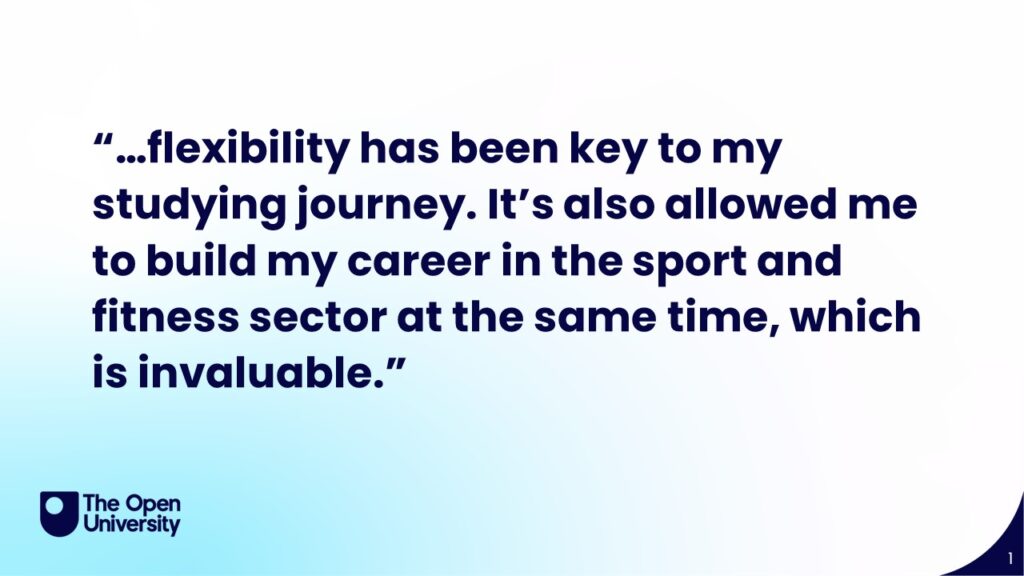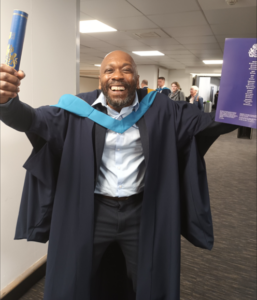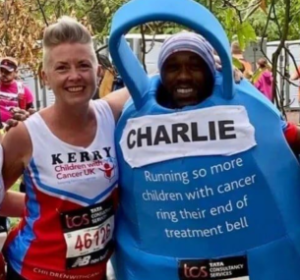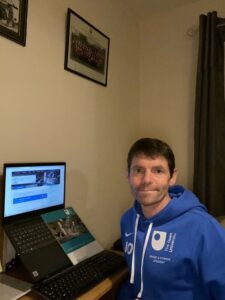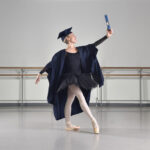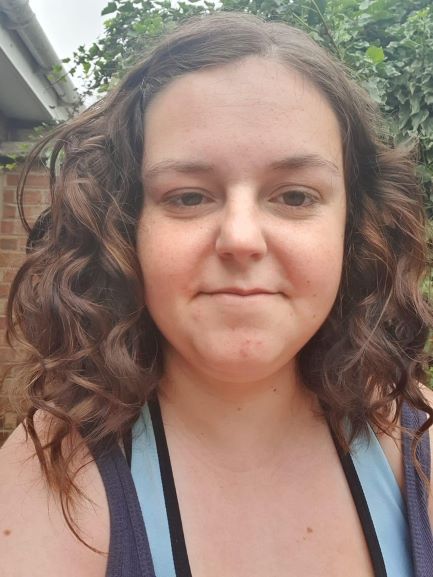Former Royal Marine Peter Dunning was playing wheelchair rugby at the Invictus Games 2018 when a fellow UK Team member told him about The Open University’s Disabled Veterans’ Scholarships Fund (DVSF). Before he knew it, he’d successfully applied and was embarking on a BSc in Sport, Fitness and Coaching degree – something which has always been his passion. After graduation, he dreams of working in sport and coaching fellow veterans.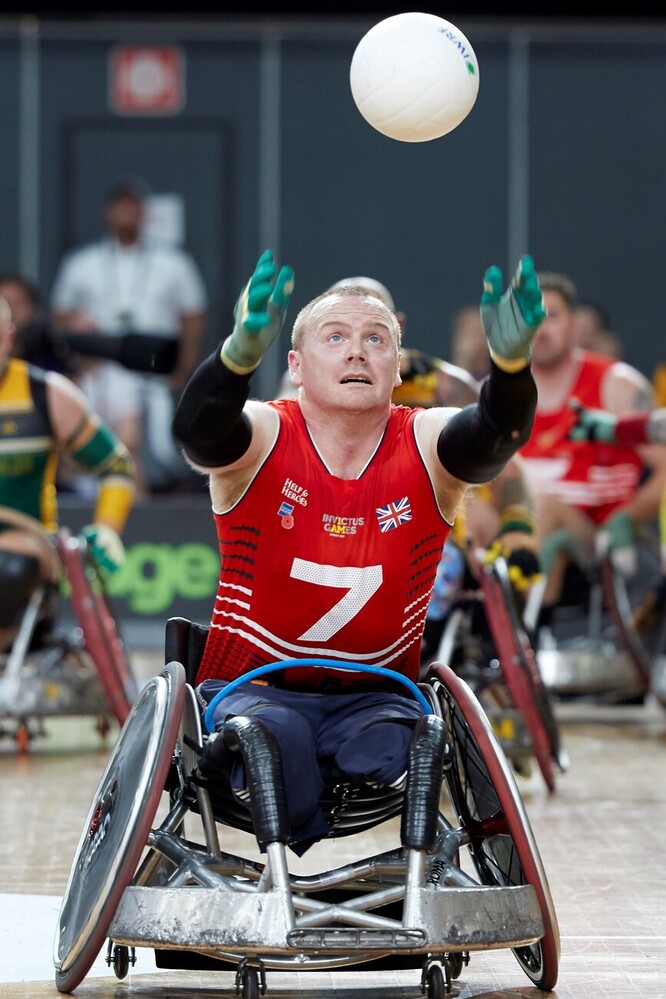 From the Invictus Games to an OU Sport, Fitness and Coaching degree
From the Invictus Games to an OU Sport, Fitness and Coaching degree
Former Royal Marine Peter Dunning was playing wheelchair rugby at the Invictus Games 2018 when a fellow UK Team member told him about The Open University’s Disabled Veterans’ Scholarships Fund (DVSF).
Before he knew it, he’d successfully applied and was embarking on a BSc in Sport, Fitness and Coaching degree — something which has always been his passion.
Now in his third year, Peter — who lost both his legs and sustained multiple other injuries on duty in Afghanistan — is on track to complete his degree in 2023. After graduation, he dreams of working in sport, coaching fellow veterans and future Invictus Games participants.
After doing his GCSEs at school, Peter studied Sports Science and Clinical Psychology at a brick university. While he enjoyed playing Rugby Union for the university team, he didn’t enjoy the clinical psychology element and dropped out.
Looking to challenge himself more both physically and mentally, Peter joined the Royal Marines and served for five years before an accident in 2008 changed his life forever. A vehicle he was in went over an improvised explosive device (IED) leaving him badly injured and unable to continue his military career or play the sport he adored.
Years later, Peter began playing wheelchair rugby and was one of eight players selected to represent the UK Team in the Invictus Games in Sydney in 2018.
“Daniel Bingley, a friend of mine who was also competing in the Invictus Games, told me about the OU’s Disabled Veterans’ Scholarships Fund,” he said.
“I knew I needed to do something else, so I looked into it further and thought ‘Why not?’.
“I wanted to choose a course that I would enjoy and that would help my future, so I went for Sport, Fitness and Coaching, and I’m thoroughly enjoying it! The sport arena is what I’d like to do career-wise, and sports is where my big interest has been ever since I was a wee dot.”
Peter got off to a great start with his studies and was nominated for an Inspirational Student Award by his tutor.
“It was a shock to be nominated for the Student Award, and it was even better to win it!” he said.
“Studying with the OU has changed me because it has made me appreciate education. I’ve been out of work and education for a while, and this has got me back into it. It’s good to get the grey matter ticking over again!
“I didn’t know if I would be able to achieve this, but I am. I couldn’t do it without the ongoing help and support of my partner either,” he added.
But studying has not been without its challenges and sacrifices. “It hasn’t always been easy, even though I enjoy it,” he said. “I suspect I have dyslexia — I’ve never had it diagnosed, but sometimes it can take me a long time to get my reading done and I’ll have to read the same line over and over again. Because it’s a topic I’m so interested in, I just keep going, but it can be challenging.
“I’m also buying a house with my partner. Moving house is stressful, so I decided to do my third year part-time instead of full-time so I don’t take on too much at once. Similarly, I was due to play in the Invictus Games in April 2023 but I’ve pulled out because I’ll be working on my end of module assignments around then.”
Peter has shared custody of his two children, so he’s had to find ways to fit in his studies around his family life.
“Having my studies really helped me in lockdown too, especially during the weeks I didn’t have my kids,” he said. “It gave me something to focus on, so it’s been a lifeline. I just made sure I was always a week or two ahead, so I was free when I had my kids to help them with their homeschooling.”
He also appreciates the way OU study is broken down into manageable blocks and said: “I love a to-do list, so I like the way OU work is set out week by week. I like ticking it off at the end of each week!
“You have to be self-motivated, but I haven’t found that hard because I genuinely enjoy the subject I’ve chosen, so I’m inspired by that. I also spoke to a local sports scientist to learn about the job, and thinking about that keeps me motivated as my goal is to work in a related field.”
The DVSF is made possible thanks to the generosity of OU alumni and donors. Each year, the Fund enables veterans like Peter to access life-changing education, so they can rewrite their futures outside of the military.
“To all the donors and everyone who helps with the DVSF scheme I have simply two words to say — thank you! I will always be happy to shout about the DVSF as it’s been of great benefit to me,” said Peter. “Having the opportunity to do the scholarship has been fantastic — I don’t think I’d have considered studying without a scholarship as I couldn’t have funded it.
“My studies have already helped my wheelchair rugby teammates and I when it comes to recovery and nutrition. The teaching materials and tutors have been great — particularly when it comes to assignment feedback and their helpful advice which helps me to perform better next time.
“I am hoping my qualification will really be of immense benefit when it comes to job searching and will make it easier to get into the area that I want to work in. Plus, lots of jobs require you to have a degree, so now I’ll be able to apply for those too. I want to get into a career in exercise physiology, biometrics or coaching — I’d love to coach for the Invictus Games!
“To anyone thinking of studying with the OU I’d say, ‘Good for you!’. My advice would be to: make sure you pick a topic you’re interested in; find a time in the day when you know you’re at their most productive to study; and give yourself plenty of time for assignments. Good luck!”

